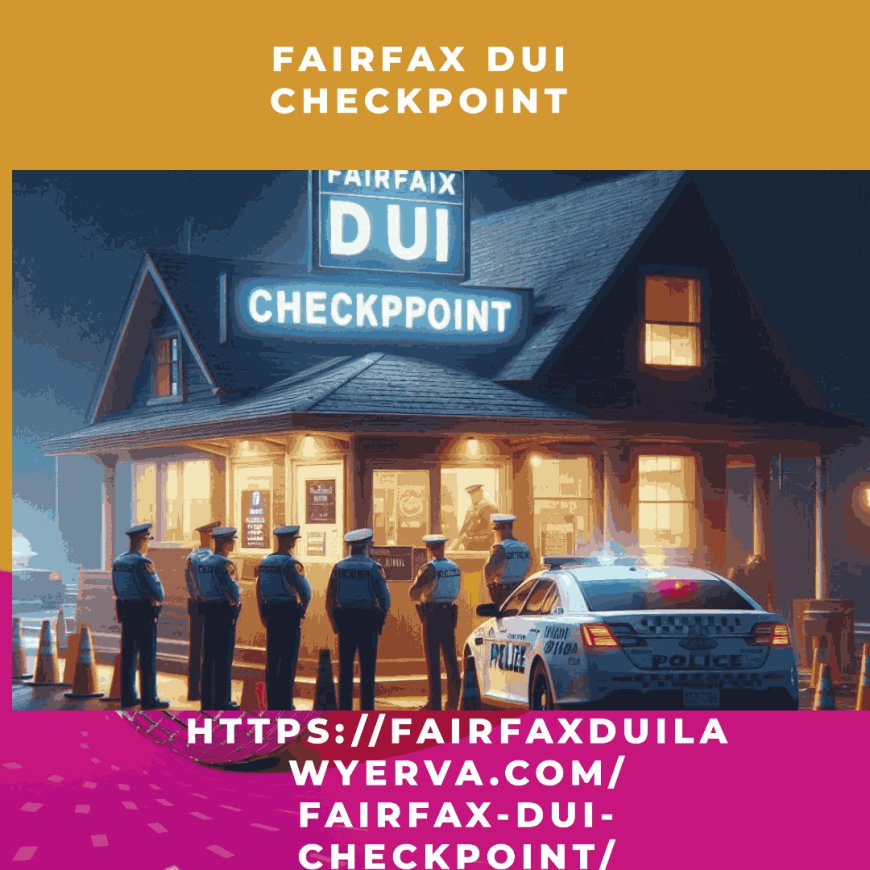5 Things Police Won’t Tell You About Fairfax DUI Checkpoints

Introduction
DUI (Driving Under the Influence) checkpoints are a familiar sight for drivers in Fairfax, especially during holiday weekends, late nights, and other peak times. While these checkpoints are designed to prevent drunk driving and enhance public safety, there’s often more going on than meets the eye. What’s less discussed are the rules, tactics, and rights that apply at these checkpoints. While police officers are required to operate within the bounds of the law, there are some details they aren’t likely to volunteer. Understanding these hidden aspects can help you better navigate a DUI checkpoint legally and safely. Here are five crucial things police won’t tell you about Fairfax DUI checkpoint.
1. You Can Legally Avoid the Checkpoint (If Done Correctly)
It’s a common misconception that drivers must go through a DUI checkpoint once they’ve seen it. In reality, you have the legal right to avoid a checkpoint if you can do so safely and legally. Police are not allowed to stop you simply for turning around or taking an alternate route, as long as you’re not breaking any traffic laws while doing so. However, sudden, erratic maneuvers like illegal U-turns or abrupt lane changes may give officers "reasonable suspicion" to pull you over. Knowing this, it’s best to plan your detour calmly and legally to avoid unnecessary attention.
2. You’re Not Required to Answer All Questions
Police may inquire, "Where are you coming from?" or "Have you had anything to drink tonight?" when you are pulled over at a DUI checkpoint. Although it may be tempting to respond courteously, you are not obligated by law to do so. You are protected against self-incrimination and have the right to silence under the Fifth Amendment. You are not required to strike up a conversation with the police, but you are welcome to provide your license, registration, and proof of insurance. "I’m exercising my right to remain silent," said politely, can be a powerful defense.
3. DUI Checkpoints Must Follow Strict Legal Guidelines
Many people don’t realize that DUI checkpoints must adhere to specific legal standards, and if they don’t, any evidence obtained can be challenged in court. For example, the location and timing of the checkpoint must be planned and publicly announced in advance. Additionally, officers must follow a neutral pattern for stopping vehicles (like every third car) to avoid claims of discrimination or profiling. If you’re arrested at a checkpoint that’s been improperly set up or operated, your attorney may be able to challenge the legality of the stop and get the charges reduced or dismissed.
4. You Can Refuse Certain Tests on the Spot
At a checkpoint, police may ask you to perform field sobriety tests, such as walking a straight line or standing on one leg. However, in Virginia, you’re not legally required to participate in these tests. Field sobriety tests are voluntary and highly subjective, meaning even sober people can fail them due to nerves, fatigue, or medical conditions. Refusing a field sobriety test at a checkpoint does not automatically lead to a DUI charge, although it may increase police suspicion. On the other hand, refusing a post-arrest breathalyzer or blood test after being taken into custody can result in penalties under Virginia’s "implied consent" law.
5. You’re Being Observed Before You Even Reach the Checkpoint
By the time you’re at the checkpoint, police have already been watching you for signs of impairment. Officers often position themselves far in advance of the actual checkpoint, monitoring how drivers react. If you’re spotted making a sudden U-turn, driving too slowly, or swerving, officers may follow you and initiate a stop based on "reasonable suspicion." Additionally, as you approach the checkpoint, officers observe your driving behavior, body language, and any signs of impairment, such as red eyes or fumbling with documents. Knowing this, it’s best to stay calm, avoid sudden movements, and have your license, registration, and proof of insurance ready to present.
Conclusion
Fairfax DUI checkpoint are a key part of the local strategy to prevent drunk driving and ensure public safety. However, they’re not without their complexities and legal nuances. From knowing your right to avoid the checkpoint legally to understanding the rules around questioning and field sobriety tests, being informed can make a significant difference. While police are tasked with enforcing the law, they’re not required to explain your rights to you. By understanding these five key points, you’ll be better equipped to navigate a DUI checkpoint legally, safely, and with confidence. If you’ve been charged with a DUI at a checkpoint, consulting an attorney is always a smart move to protect your rights and your future.

 ayaanjo
ayaanjo